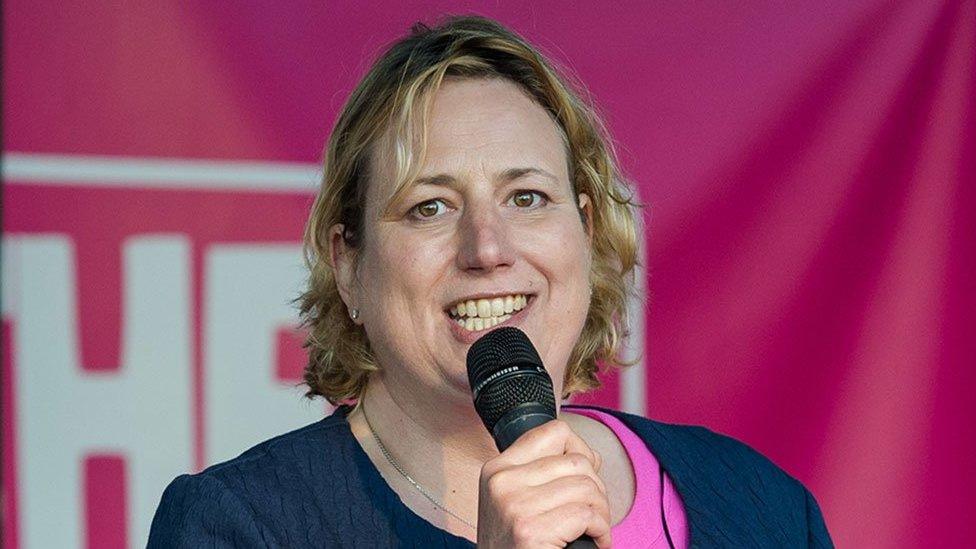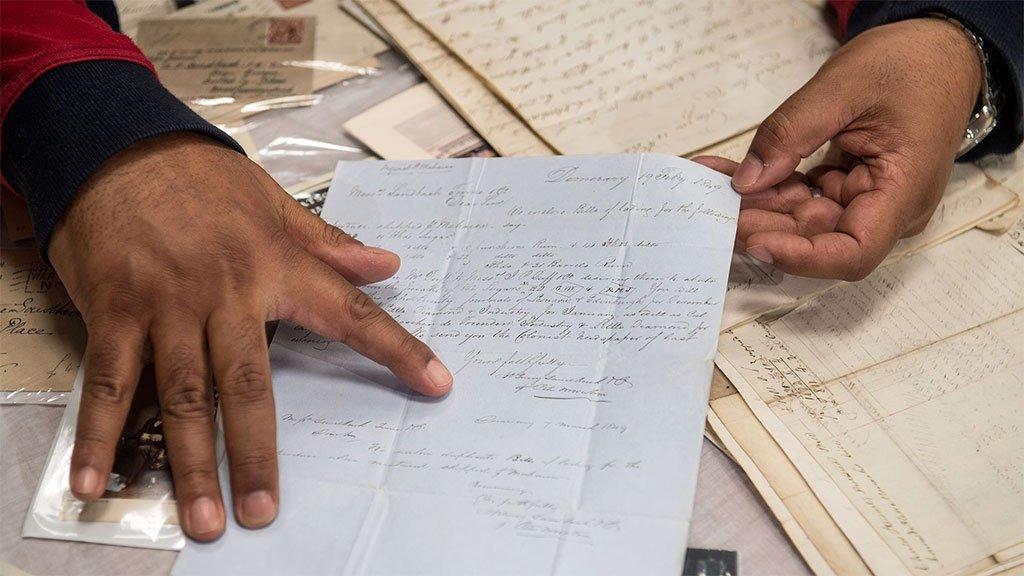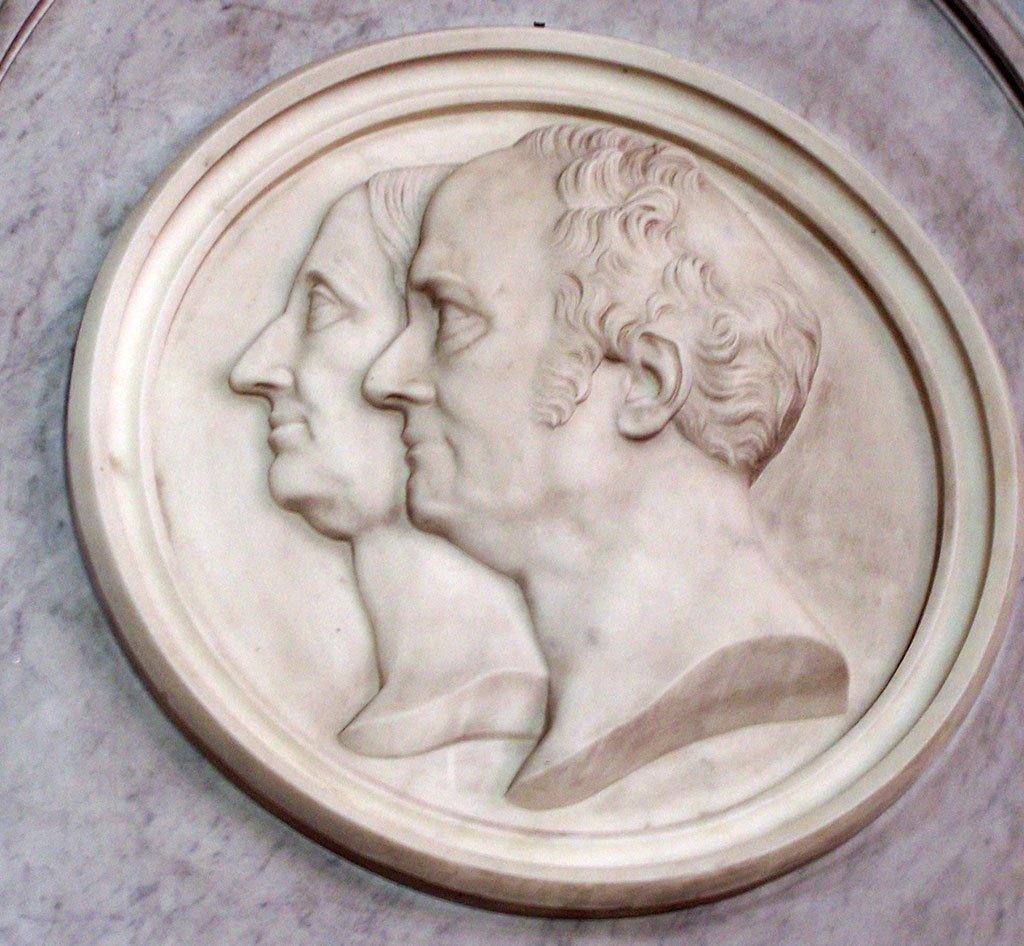Antoinette Sandbach: Ex-MP asks to be removed from slavery research
- Published

Antoinette Sandbach speaks during an anti-Brexit rally in Parliament Square, London, 2019
A former Conservative MP has asked to be removed from an award-winning academic's research presented in a TEDx Talk that connects her to a slave-owning ancestor, the BBC can reveal.
Malik Al Nasir named Antoinette Sandbach as a descendant of Samuel Sandbach in a video published in 2021.
The Liverpool merchant had a stake in plantations in the West Indies.
Ms Sandbach argues there is no public interest in identifying her as his descendant.
She says she supports Mr Al Nasir's research but accuses him of singling her out, when there are many other living relatives.
Mr Al Nasir, a poet and an author, has been researching his family's link to the transatlantic slave trade for decades.
The BBC first documented his roots quest in 2020, when he discovered his links not only to Sandbach Tinne's enslaved Africans but also the slave owners.
He has continued that work as a PhD student at the University of Cambridge.
"This is a fundamental right that is being put under threat by the notion that anyone, who doesn't like what you find, can demand censorship on the grounds of their own perceived rights of privacy," Mr Al Nasir told the BBC.
The University of Cambridge said it was unable to comment on ongoing legal matters.
However, a spokesperson at Mr Al Nasir's college, St Catharine's, told the BBC: "St Catharine's is absolutely committed to upholding freedom of speech and ensuring all of our students, including Malik Al Nasir, are able to freely pursue their scholarly interests."

Malik Al Nasir's work has been described as ground-breaking by professors at Cambridge University
In 2021, Mr Al Nasir presented a TEDx Talk in which he explained how he discovered his family tree, which can be traced back to the sugar plantations in Demerara, in what was then British Guiana and is now Guyana.
In the video, Mr Al Nasir mentions Antoinette Sandbach and her ancestral connection with Samuel Sandbach.
In emails to the University of Cambridge earlier this year, the former Conservative MP for Eddisbury in Cheshire makes clear she is not sympathetic to her ancestor, and describes slavery as appalling. But she argues that she has a right to be forgotten.
Ms Sandbach was previously a member of the Welsh Assembly and a Conservative MP, until she rebelled against her party over Brexit, and became a Liberal Democrat in 2019.
Samuel Sandbach was a slave trader, West Indian merchant, who co-founded the firm Sandbach Tinne & Co, based in Liverpool. He was part of a multinational conglomerate of family firms which included McInroy Parker & Co in Glasgow and Sandbach, Parker & Co in Demerara.
Mr Al Nasir's research reveals the scale of the business empire which incorporated shipping, banking, insurance, railways, distilleries, and plantation slavery. The company monopolised much of the Demerara sugar trade during the late 18th Century and the 19th Century.
It was compensated for more than 600 slaves after the UK Parliament passed a law to abolish slavery in most British colonies in 1833.

Malik Al Nasir has an archive of hundreds of letters related to the transatlantic slave trade
The merchant owned an estate in North Wales, which incorporated the stately home Hafodunos Hall.
Mr Al Nasir claimed in his research: "The estate of Samuel Sandbach was 5,000 acres, it incorporated not only Hafodunos Hall, sold off in the 1930s, but the surrounding farms, with cottages that now form part of Antoinette Sandbach's estates known as Hafodunos Farms Limited."
Asked by the BBC if any of this information was incorrect, Ms Sandbach said over half the estate was sold in the 30s and also pointed out that land owned by the family today had been added to and developed since the 1960s.
Today, cottages on surrounding lands are available to rent as holiday lets. They are advertised on Antoinette Sandbach's X account and Companies House shows Antoinette Sherratt nee Sandbach is a director of the company known as Hafodunos Farms Limited.
The former MP told the BBC that Hafodunos Farms Limited was established by her father in the 1970s. It is unclear how he came into possession of the land and cottages.
In emails sent to the University of Cambridge, Ms Sandbach questions the accuracy of elements of Mr Al Nasir's research, including the claim that the Sandbach family made all their wealth from slavery.
She also stated that she no longer lived on land connected to the Sandbach Family estate. A written correction was added to the TEDx Talk, which remains embedded on the University of Cambridge's website.
In the emails, she describes slavery as abhorrent but also appears to suggest there were similarities between the treatment of African slaves and the treatment of Victorian housewives.
Mr Al Nasir told the BBC his research shows how enslaved people suffered at the time.
Mr Al Nasi said: "Sandbach Tinne's enslaved Africans were worked to death on their plantations and accounted for in the financial accounts amongst livestock and when they died, their perceived asset value was written off under the 'negro account'. This process of dehumanisation of African people, by Sandbach Tinne and other slave traders lives on to this very day."
Mr Al Nasir's work has been described as ground-breaking by professors at Cambridge University and has won the vice chancellor's prestigious award for Global Impact and the Sydney Smith Memorial Prize for outstanding work and contribution to literary life of the college. It has also been praised by Sir Hilary Beckles, chair of the Caricom Reparations Commission and vice chancellor of the University of the West Indies.
In one email, Ms Sandbach appears to threaten legal action, accusing the university of failing to protect her right to privacy.
Mr Al Nasir told the BBC: "The threat of legal action is an affront to academic freedom, as a historian it is imperative that I have academic freedom to research history and to display without fear or favour what I find."

A marble relief on the wall of St Digians Church near Hafodunos estate has a eulogy to Samuel Sandbach and his wife Elizabeth
In a thread on X, formerly known as Twitter, posted after the BBC published this story, Ms Sandbach said she was "appalled by the actions of my distant ancestors" and "would never seek to prevent free speech or suppress academic research".
"In this case, I objected to ongoing data breaches by Cambridge University and Mr Al Nasir which compromise my personal safety," she wrote.
She said she had been "repeatedly threatened" by a number of people over her position on Brexit when she was an MP.
Ms Sandbach said although she had not been subject to racism, "the closest prism through which I can relate is that of women's oppression".
"Many of the racist tropes of the past were also used to suppress women's rights," she continued.
The row comes amid a growing national debate over reparations and Britain's historic role in slavery.
Mr Al Nasir told the BBC that "part of reparatory justice is about being able to understand historical truth, to do that we have to be free to do the historical research".
A UN judge said the UK is likely to owe more than £18tn in reparations for its involvement transatlantic slavery.
But Prime Minister Rishi Sunak recently dismissed a call for the government to apologise and pay reparations. The PM said "no", adding "trying to unpick our history is not the right way forward". The UK government has never formally apologised for its role in the slave trade.
A descendant of William Gladstone recently visited Guyana to apologise for his family's part in the slave trade.
The 19th Century prime minister was the son of John Gladstone, one of the largest slave owners in the British West Indies.